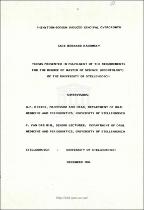| dc.contributor.advisor | Dreyer, W.P. | |
| dc.contributor.author | Radomsky, Jack Bernard | |
| dc.date.accessioned | 2022-04-19T08:22:00Z | |
| dc.date.available | 2022-04-19T08:22:00Z | |
| dc.date.issued | 1984 | |
| dc.identifier.uri | http://hdl.handle.net/11394/9046 | |
| dc.description | Magister Chirurgiae Dentium (MChD) | en_US |
| dc.description.abstract | Epilepsy is a fairly common condition and the anti-convulsant drug,
phenytoin sodium, has been used in its treatment for over 40 years.
Shortly after its introduction, the side-effect of gingival overgrowth
was re'{XJrted and has been the subject o t of mw h research. Epidemiological
studies showed that; gingival overgrowth developed in approximately
half the patients treated with this drug, possibly indicating an individual
patient susceptibility to this effect of the drug. | en_US |
| dc.language.iso | en | en_US |
| dc.publisher | University of Stellenbosch | en_US |
| dc.subject | Phenytoin-sodium | en_US |
| dc.subject | Epilepsy | en_US |
| dc.subject | Anti-convulsant drug | en_US |
| dc.subject | Gingival overgrowth | en_US |
| dc.subject | Patients | en_US |
| dc.title | Phenytoin-sodium induced gingival overgrowth | en_US |
| dc.rights.holder | University of Stellenbosch | en_US |

